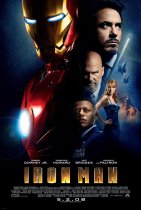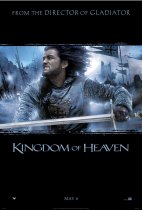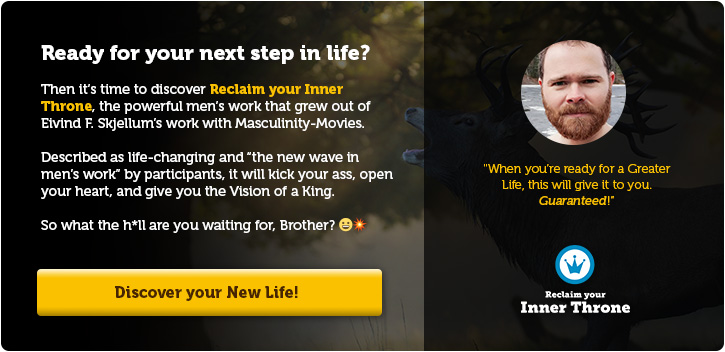The Lion King (1994)
Synopsis
The young lion cub Simba, the heir of king Mufasa, is forced into exile when his uncle Scar kills his father and leaves him with the blame. Simba is saved by Timon and Pumbaa, a meerkat and a warthog, who teaches him to leave his past behind him and not to worry – Hakuna matata.
Can Simba find his way back to his true identity, return to challange Scar and claim the throne that is rightfully his? Or will he continue his laidback, no rules, no responsibility slacker lifestyle?

| Genre | Drama |
| Production year | 1994 |
| Director | Roger Allers, Rob Minkoff |
| Male actors | Matthew Broderick, Jeremy Irons |
The journey towards the king within
by Kristian Stålne
Today we don’t have any myths to tell our children in the modern world. Fortunately we can rely on the myths that are transmitted through the movies. A good example of a movie that I let my boys watch is Disney’s modern classic The Lion King since it contains many good lesions for a boy – and for a man – to learn.
The beginning
The story features Simba who is born and hailed as the next king after his father, the current lion king Mufasa who teaches his son about the ‘circel of life’ and what it takes to be a king. Mufasa’s brother Scar, however, wants the throne for himself and uses his cunning to try to get rid of both Mufasa and Simba.
First he tricks the young and eager Simba to go to the elephant graveyard where Scar’s allies, the hyenas, await him. Mufasa saves him from the hyenas and teaches Simba that courage is not absence of fear and certainly not rushing into danger. A king needs to be much wiser and more mature than so.
Next time Scar succeeds with his plan when he lures Simba into a ravine where his hyena companions set a heard of gnus on the runaway in his direction. Scar then tells Mufasa who rushes to his son’s rescue. He barely manages to get Simba to safety but finds himself hanging from a cliff where Scar can give him the final blow and throw him to his death. Scar then convinces Simba that it was Simba’s fault and sends the hyenas after him. Then Scar can claim the throne along with his hyena friends.
New start – new rules
Simba, who managed to escape, is found in the desert by the meerkat Timon and the warthog Pumbaa who adopt and raise Simba with guidance from their own problem-free philosophy Hakuna matata – no worries! And no responsibilities! Just put your past behind you, bad things happen and there is nothing you can do about it. And instead of hunting pray Simba learns to eat bugs and worms. Timon literary files his claws down.
Isn’t this the perfect illustration of the condition of the modern man? Being cut off from the past, from our own source of ancient masculinity, from our own identity. Feeling a pressure to stop oppressing women, stop destroying the world, stop being in the way, and where masculinity is viewed as a something that is destructive and problematic per se, even leaving us with a strong sense of guilt and shame. Trying to find guidance in self-help books telling us to be more in the present, to give up all identity, to forgive the past or just to be nice, happy and harmless.
In the now grown up Simba’s case he can recognize that something is missing in his life, a loneliness despite his friendly and caring company. Fruitlessly, he searches for his father in the stars where he was told to find him and all other kings of the past.
Simba awakens
But Simbas masculine powers are soon to be awaken by two visits. First by his childhood friend Nala, now a lioness, who opens Simba’s heart as they quickly fall in love as they were destined. But when she urges him to return and challenge Scar to the throne he reverts to his old strategy of “Hakuna matata”, thus escaping from his responsibility to Nala’s great disappointment.
His lack of courage isn’t exactly attractive to the lioness, but her main concern is that her savanna has been turned into a wasteland by Scar’s mismanagement. Scar was never interested or wise enough to respect the nature’s balance and the circle of life, he was only in it for his own gain and is now bored by the situation that he obviously cannot handle.
Next the old wise mandrill Rafiki pays Simba a visit and just like a zen master or a jester he guides Simba into some deep soulwork in order to find his father and get in contact with his true self. In a scene that resembles Luke Skywalker’s jedi training Simba follows Rafiki through a dark and shady forest and finding not Darth Vader but his father Mufasa in his own reflection in the water, in the bottom of his own soul. “He lives in you” Rafiki says.
Then Simba hears Mufasa’s voice telling him that he has forgotten about his father and forgotten who he is. Simba thought that his father had abandoned him, but it was really he who hadn’t dared to look for him from the guilt he still carries. In order to find his father and all the past kings he now has to remember who he is, and that is much more than what he has become up till now.
The return of the king
Simba is far from done in his work with himself but nevertheless he knows that he has to return to free his country from Scar’s reign with the aid of his friends Nala, Timon and Pumbaa. Simba may be the stronger of the two combatants, but Scar has the psychological advantage. Simba still believes that he is guilty of his father’s death, which Scar uses to his advantage when he forces Simba to the edge of the cliff, just as his father.
Unfortunately for Scar, his pride betrays him as he cannot resist telling Simba that he killed Mufasa. What’s the point of being cunning and outwitting everyone if there’s no one to share it with and no one to admire it, something practically all movie villains seem to think.
And with that all Simba’s destructive energy of guilt that until now has been turned inwards is released and transformed into pure rage within a blink of an eye and Simba can counter attack. Now Simba has reached his full potential and he can defeat Scar and the hyenas can be driven out of the country.
The circle is closed and continued
The movie ends as it started with Rafiki lifting the new lion cub, Simba’s and Nala’s son, to be hailed by all the animals of the lands as the next king – that is, if he can grow up to be one. And the circle of life continues.
Powerful ideas from The Lion King
- No one is born king, you may become one by maturing by answering to life’s challenges, but it’s a long journey that cannot be made without guidance. This is a lesion in what it takes to grow up to be a king. Or rather, what it takes for the king to grow out of you.
- Today there is a lot of cult around wise teachers and mentors such as master Yoda from Star wars, Morpheus from Matrix or Mr Miyagi from Karate kid among young men. This is a certain sign that we lack Mufasas as fathers and faces Timon and Pumbaas as parents instead.
- If you want to be a man, not just a man but to be a representative of manhood of all times you have to face the guilt from all the past wrongs. If you identify as a man in this sense you are also responsible for everything that men have ever done, good things as well as bad things, it’s part of the package. You have Mufasa and Simba in you, but also Scar.






